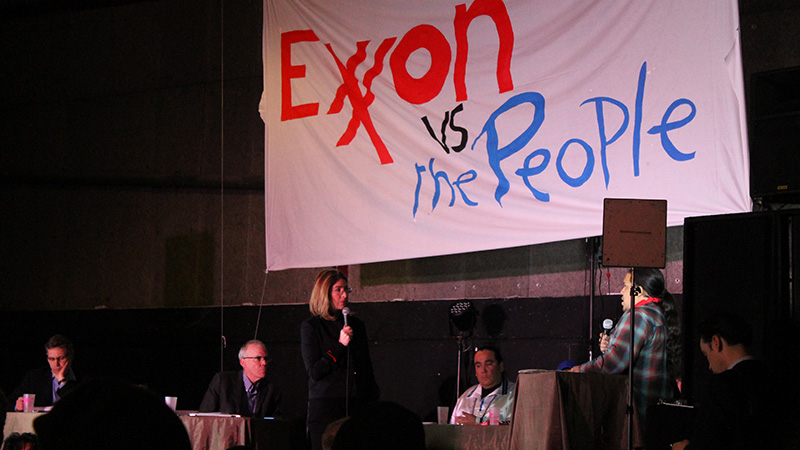By Hana Keegan
Exxon Mobil, a massive fossil fuel corporation, has a lot of money to invest in scientific research about fossil fuels. Journalists have recently unveiled that, from as early as the 1970s, Exxon knew that burning fossil fuels would cause climate change. The corporation is now under criminal investigation in New York for not telling their investors and the public about these findings.
On December 5th, Naomi Klein and Bill McKibben held a public trial in Paris to enact the prosecution of Exxon’s corporate crimes and, in doing so, raise public awareness. A group of activists, journalists, scientists and community-members testified, sharing stories of the horrific impacts of the fossil fuel industry on people, animals and environments. There were stories of sea-level rise in the Marshall Islands, decreasing reindeer populations in Alaska, gas flaring in the Niger Delta. Leukaemia, cancer, asthma and depression were all listed as issues that had infiltrated previously healthy communities. These testimonies were vital because they gave faces to the impacts of the fossil fuel industry, while also highlighting the international stretch of it’s influence. The air that filled the spaces between the trial’s public audience was heavy, weighed down by it’s seriousness. As Klein emphasised, although the event was a “mock trial,” there was nothing funny about it.
25 years ago, Exxon could have publicly shared their research about the connection between fossil fuels and climate change. Instead, the company buried it’s findings and began funding climate change denial campaigns. If the public found out, it would seriously threaten the economic stability of and demand for fossil fuels. What if Exxon, an international corporation, had taken an ethical stand and used their economic and political influence to raise awareness and initiate a transition to clean, renewable energy sources? If they had spoken up, would we now be balancing on the brink of a complete climate catastrophe? The fact that Exxon chose to not share its findings raises key questions about the ethical responsibilities of corporations. I am also wondering who is the “they” that is accountable? Are Exxon’s corporate crimes solely to blame on suited business men in offices, or also on a larger system of power and warped economic values? How do we address the root of the problem?
McKibben believes that this “rapidly evolving Exxon scandal may represent the next great phase of the climate movement.” Attended by civil society who had travelled to Paris for the COP21, the public trial was a vital event because it raised awareness. It gave us the opportunity to listen to the voices of those worst affected by the fossil fuel industry, and to understand them as proof of a corporate crime. Since attending my first COP, COP21, I have realised the importance of these times and spaces in which groups of people can come together to share knowledge. I am fascinated by the time, experiences and creativity that it takes to build a movement. It is reassuring to have witnessed this mock trial as the opening of a new phase in the climate movement in which climate justice may be brought about through the law.
Read more on Democracy Now:
http://www.democracynow.org/2015/12/2/as_ny_state_probes_exxon_oil
http://www.democracynow.org/2015/12/11/a_rogue_company_leading_glaciologist_on
